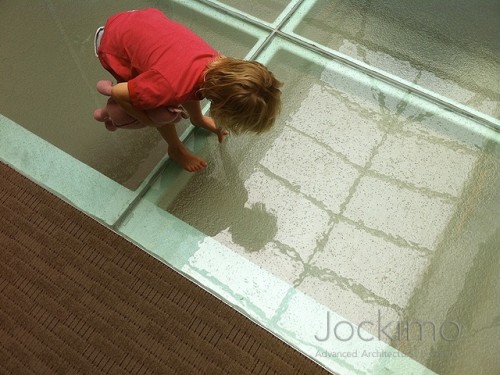- Details
5 Myths About Glass Flooring
Glass flooring is beautiful, durable, and makes a statement wherever it is installed. It comes in a variety of colors and textures and is exceedingly versatile. At Jockimo Architectural Glass Products, we manufacture our decorative architectural glass to the highest standards and strive for the best when it comes to beauty, durability, and safety.
But some people have misconceptions about using glass flooring in their latest project. Let's look at some of the most common myths and explain why they're wrong.
Myth #1: Glass Flooring is Slippery
When it comes to glass, most people think of the smooth surface of a window pane or a wine glass. And that glass is indeed slippery, but those items are made to be slippery for easier manufacturing and aesthetics. Without a smooth surface, it is harder to see out of a window, and most people enjoy the smooth feel of wine glasses. But when you are using glass as a flooring option, you want there to be enough texture so people won't slip.
Glass flooring is created with anti-slip properties to ensure the safety of those walking across it. At Jockimo, we've designed our glass flooring to have the highest anti-slip rating in the world, so you can rest assured that the floor you walk on is safe, even when wet. In fact, our anti-slip glass flooring has been used in businesses, airports, government buildings, and even outside high-traffic areas.
Myth #2: Glass Flooring isn't Strong Enough to Walk on
Glass flooring is remarkably strong and is designed to carry loads such as people standing and walking across it. To ensure that the glass can hold weight, we've designed each glass panel to be three-ply, that is, three panes of glass pressed together. Not only does that make the panel stronger, but if one pane somehow breaks, the other two panes will hold the load without a problem. This triple redundancy prevents the flooring from breaking and provides the highest possible safety.
What's more, most glass flooring is made from glass that's usually an inch and a quarter thick. International building codes and ASTM glass flooring standards require glass floors to be a certain thickness for safety.
#3 Glass Floors are Fragile and Unable to Handle Daily Wear Like Other Flooring
When it comes to weight and daily wear, it’s important to remember that glass floors are designed for precisely this application. Glass is incredibly strong and resilient, and quite capable of holding heavy loads.
Glass can break due to blunt trauma caused by a high impact with a narrow object. But should that happen, our glass flooring is designed for safety and has security measures built-in, so you never have to worry that the floor won't hold the weight.
As long as the buyer chooses professionals with glass expertise to design, engineer, and manufacture your project, your glass flooring will be just as strong--if not stronger than--a floor supported by traditional wood joists.

#4 Glass Flooring Isn't Weather Resistant and Can't Be Used Outside
When designed and built with the proper safety features, glass flooring can be used in exterior projects as well as interior ones. Just make sure that the designers understand what thickness, support, and safety features are needed to ensure your beautiful glass flooring will last a long time. Those safety features should include anti-slip properties and fail-safes such as triple-ply glass, so the flooring is as safe, or even safer than other types of flooring. Glass flooring can beautify your outdoor project, whether it's a walkway, a balcony, a deck, or anything else you care to imagine. Glass flooring can be incredibly strong and will look beautiful year after year, even outside.
#5 Glass Floors Are All the Same
No glass flooring project is the same, and therefore no two glass floors are exactly alike. When it comes to manufacturing a glass floor, the designer must take into consideration the following requirements:
- Size and shape
- Usage (high traffic or low?)
- Weight-bearing requirements
- Exposure to UV and sunlight
- Exposure to the elements
- Anti-slip requirements
- Overall aesthetics
- Glass thickness
- Color of glass
- Patterns
As you can see, glass flooring must be custom-tailored to each project and designed specifically for that project. That's why it is so important to find a designer that specializes in working with glass flooring. Otherwise, you may have design and safety issues you might not expect.
When you’re ready to begin your next glass flooring project, contact us at Jockimo Inc. today! Learn more about our NEW Jockimo True Colors colored glass. We can help you design, develop, and manufacture your glass flooring to bring out the beauty of your project.

